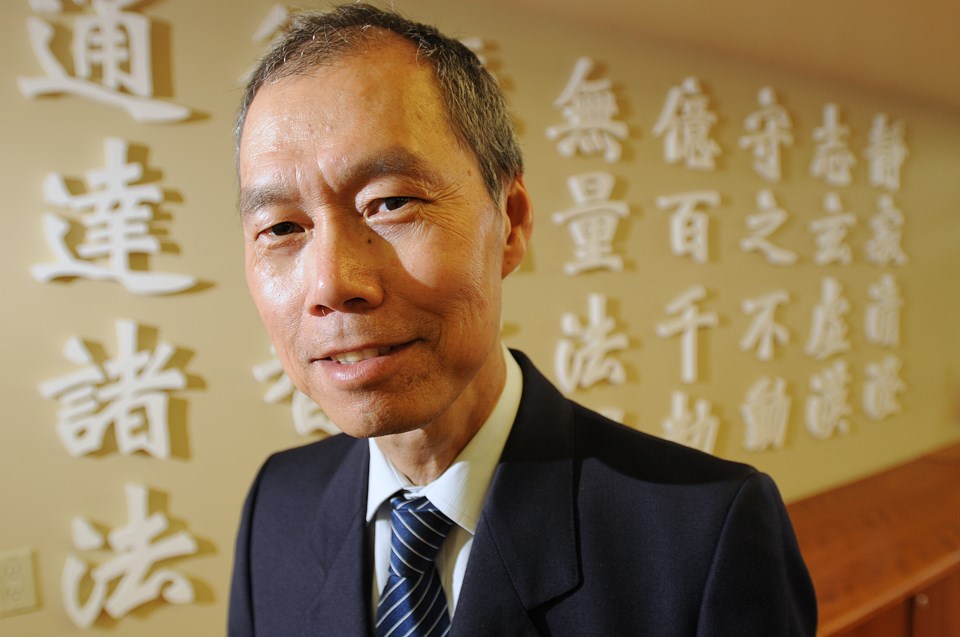Driven by their Buddhist beliefs, 30 women in Taiwan in 1966 began putting aside an equivalent of about two cents of their grocery money each day. The money was used to aid the local poor. That small act of combined charity has grown into a multimillion dollar global relief agency and the nun who began it is sometimes called the Mother Teresa of Asia.
From a nondescript office in Marpole, the Vancouver chapter of Buddhist Compassion Relief Tzu Chi Foundation has, since 1992, run diverse programs that see teams of uniformed volunteers cooking food at the Salvation Army in the Downtown Eastside, visiting seniors’ homes, and distributing blankets, towels, soap, socks and gloves to the homeless.
Chapters throughout the Lower Mainland send volunteers to sort trash from recycling after major community festivals such as the Festival of Lights. A Tzu Chi TV station in Asia is 50 per cent funded by recycling newspapers and bottles.
Tzu Chi, which translates simply as “compassionate relief,” also runs weekend schools in Vancouver and three suburbs that inculcate the millennia-old Buddhist values — respect for teachers and their knowledge, filial piety, right from wrong from Buddhism’s perspective — to successive generations.
For Rene Li, an accountant who has been a Tzu Chi volunteer going on two decades, the organization is an opportunity to put his Buddhist values into practice.
“Many Buddhist organizations tend to focus on liberating and saving oneself, doing the chanting and cultivation and things like that,” says Li. “This organization adopts a different approach. They say it is important to do your chanting or your personal cultivation, but it is equally important to reach out to the community, to put your words into action. There are people lying on the street suffering from hunger, suffering from cold.”
Li’s particular area of volunteerism is disaster preparedness and relief. He is Tzu Chi’s rep on the province’s Integrated Disaster Council and he helps coordinate responses to crises locally and internationally. Often working alongside groups such as the Red Cross and the Salvation Army, Tzu Chi teams have been dispatched to respond to flooding in Squamish and southern Alberta, the Kelowna forest fires and apartment building fires throughout the Lower Mainland.
“In one case, the fire department allowed residents 15 minutes to return to their apartments after a fire to retrieve personal belongings,” says Li. The elevators were out of service and there was water flowing down the stairwells. “For elderly and disabled residents, this was a challenge.”
Tzu Chi volunteers spoke to residents to see what they wanted retrieved and then ran up the stairs to collect it.
While Tzu Chi, with chapters in 50 countries, operates on the idea that a local chapter should focus on local concerns, the global organization can be mobilized for massive catastrophes. Li himself has travelled to China and Haiti for earthquake relief and to New York after Hurricane Sandy. The volunteers distribute food and other necessities, and build temporary schools. They also provide emotional comfort, a shoulder and open ears. All expenses on relief trips like these — airfare, accommodation, meals — are paid out of pocket by the volunteer.
The manner in which Tzu Chi volunteers present their relief aid is distinctive. Using both hands to present an item, they bow gently before the recipient.
“We want to get the message across that we know you are having a difficult time, not because of what you have done but because you are less fortunate than we are,” says Li. “We thank them for giving us the opportunity to humble ourselves. I treasure this opportunity, so I say, ‘yes I’m giving you material, but thank you for humbling me so I can do it with better passion next time.’”
It is a statement of Tzu Chi’s reputation that it has been welcomed into China. It is significant that the Chinese communist regime allowed a religious-oriented organization based in Taiwan to work on the ground in mainland China.
Li emphasizes that volunteers do not need to be Buddhist. Many are atheists or adhere to another religion. Still, signing on isn’t a sure thing.
There is a two-year, invitation-only training program during which the volunteer and the organization determine whether it’s a good fit. After successful completion, new recruits travel to Taiwan, where they assemble at Tzu Chi’s international headquarters in their blue and white uniforms and are inducted by the founding master (a gender-neutral term for the nun who began and still leads the organization), Cheng Yen.
The uniform is a practical thing, Li says. In disaster situations, for example, it is a quick way for first responders and others on the scene to identify volunteers. It also signifies the team spirit and represents Tzu Chi to the world.
“Buddhism promotes that we are all humans,” Li says. “We all come from the same source. To some extent, we are almost like brothers and sisters. Even though we are not blood related, if we encounter someone who is suffering, we feel the suffering just as though it is happening to ourselves. That is what motivates us to reach out.”
pacificspiritpj@gmail.com



